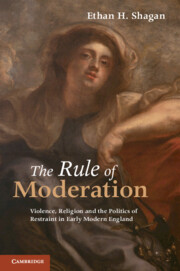Book contents
- Frontmatter
- Contents
- Figures
- Acknowledgements
- Abbreviations
- Prologue
- Part I Moderate foundations
- Part II Moderate churches
- Part III Moderate rule
- 5 English expansion and the empire of moderation
- 6 Social moderation and the governance of the middle sort
- 7 Moderate freedom in the English Revolution
- 8 How toleration became moderate in seventeenth-century England
- Conclusion
- Bibliography
- Index
- References
Conclusion
from Part III - Moderate rule
Published online by Cambridge University Press: 05 June 2012
- Frontmatter
- Contents
- Figures
- Acknowledgements
- Abbreviations
- Prologue
- Part I Moderate foundations
- Part II Moderate churches
- Part III Moderate rule
- 5 English expansion and the empire of moderation
- 6 Social moderation and the governance of the middle sort
- 7 Moderate freedom in the English Revolution
- 8 How toleration became moderate in seventeenth-century England
- Conclusion
- Bibliography
- Index
- References
Summary
This book has argued that a cluster of ancient ethical ideals organised around ‘moderation’ and the ‘middle way’ acquired new meaning and singular importance in English public life between Henry VIII's break with Rome and the Glorious Revolution. Yet unexpectedly, these ubiquitous moral principles often functioned as aggressive polemical weapons and tools of social, religious and political power. Understanding how and why has taken us back and forth across two centuries, through topics ranging from Reformation theology to imperial expansion to political theory, and deep into the ideological heart of early modern England.
We began with the observation that moderation meant government, with no firm boundary between the ethical governance of the passions and the political governance of subjects. Claims for moderation thus routinely combined notions of interior virtue and exterior restraint in ways that would make little sense today. A moderate person – or, by extension, a moderate Church, state or society – was one in equipoise, neither excessive nor deficient, but that equipoise might result from external government as well as self-control. Conversely, moderation was the active process of restraint that resulted in a virtuous middle way, and that process might entail an array of external pressures ranging from polite admonition to public execution. The early modern concept of moderation, in other words, combined and subsumed the conditions of peace, equanimity and reasonableness with the coercion, exclusion or violence that produced them.
- Type
- Chapter
- Information
- The Rule of ModerationViolence, Religion and the Politics of Restraint in Early Modern England, pp. 326 - 341Publisher: Cambridge University PressPrint publication year: 2011

